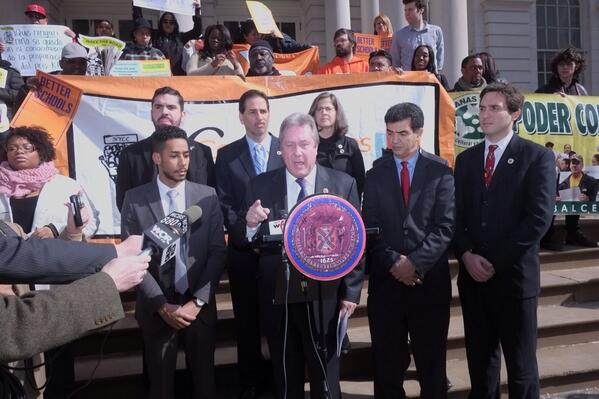By Kristen Meriwether

The New York City Council will once again see a bill on term limits introduced, although this one is not likely to be as controversial as the last time.
On Wednesday Council Members Danny Dromm and Ben Kallos will introduce legislation to impose a six-term limit for members of Community Boards, capping tenure at 12 years. Currently, community board members can serve as many two-year terms as they wish, so long as they continue to be approved by their respective borough president.
“Communities change and I believe Community Boards should change also,” Council Member Dromm said by phone Tuesday evening. “I applaud those people who spend 30 or 40 years on a Community Board, and I thank them for service. But I do think we need to move things around.”
The bill would not affect members currently on the boards, only those elected to a first term on April 1, 2016 or after.
“Many more New Yorkers should have the opportunity to serve on their local community boards and share their valuable perspectives,” Council Member Kallos said by email Tuesday. “I want to create a culture of mentorship and knowledge-sharing, so residents who have been on for a long time can help train new members as they move to an informal role.”
The city’s 59 Community Boards represent slightly smaller areas of the city than city council districts, of which there are 51, and focus largely on qualify of life issues. But Community Boards also play a vital role in the land use process (also known as ULURP). Developers must see their projects passed through Community Boards before getting them to the City Council. The Boards are the first line of defense for projects and often the best place to negotiate things like affordable housing, park space, or schools in exchange for development.
Manhattan Borough President Gale Brewer served on Community Board 7 in Manhattan for years before being elected to the City Council. During her time on the Community Board, she said the Board heard numerous highly complicated land-use proposals. Brewer, who is not supportive of the bill, said the veteran board members with years of institutional knowledge were vital.
“The expertise on that board is what enabled us to get 500 units of affordable housing [for Riverside Center],” Brewer said by phone Tuesday. “Without [the veterans’] land use experience we would have been overwhelmed by the developers.”
She argued that if a board member was not fulfilling their duty then they should be removed from the Board. But she warned, “Without that kind of expertise, the developers will have a field day.”
Kallos argued term limits don’t have to be an end to participation on the Boards for members.
“Residents who have served a long time on the boards as well as community groups with knowledge and expertise can and should continue to mentor and train newer members, so that more individuals can have the chance to join the boards and serve their communities,” Kallos said.
Dromm said he understands it takes a while to understand the process and structure of the Community Boards which is why the bill is looking at a possible tenure of 12 years, not the eight years imposed on elected officials (he was quick to reassure he had no intention of changing term limits for elected officials).
While institutional knowledge is certainly useful, Dromm said, new people bring new ideas—and that’s not always a bad thing. He pointed to 2001 when 37 of the 51-member city council body were elected to be freshmen due to term limits. He said the new group came in and navigated the city through one of the worst periods in New York City history.
“It is important to have people with some institutional knowledge, but I do feel like 12 years is enough on the Community Boards and that others should be given the opportunity to have input in the direction of the community,” Dromm said.
For more visit the Gotham Gazette here.

